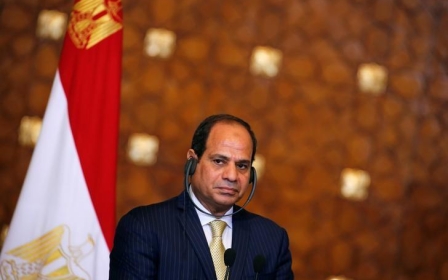Egypt increases food prices for second time in three months

Egypt has increased the prices of subsidised sugar and cooking oil for the second time in three months, amid rising inflation and a struggling economy.
The decision, announced last week, increased the price of subsidised sugar by 14.3 percent – from seven to eight Egyptian pounds a kilo (about 40 cents), and increased the price of subsidised oil by 20 percent, from 10 to 12 Egyptian pounds.
Last November, Egypt suffered a sugar crisis that increased tensions in the country.
Egypt imports about one million tonnes of sugar annually, but an acute shortage of dollars has cut the imports by private traders, leaving the market short as the government scrambles to fill the gap.
Major food companies such as Pepsi halted production in Egypt after the government seized weeks of sugar supplies, amid nationwide shortages of the staple.
The latest price increases closes the gap between subsidised sugar and oil and those on the free market.
Subsidised sugar is now only three Egyptian pounds cheaper than that on the market, and for cooking oil the gap is now six Egyptian pounds.
Speaking to Egyptian TV last week, Minister of Supply Karim Gomaa said "this increase may not be the last" and attributed the increase to a rise in raw material prices.
Figures from Egypt's official statistics agency released last month said that annual urban consumer price inflation had jumped for the second month since the Egyptian pound was floated last year to reach 23.3 percent in December from 19.4 percent in November.
Amr Khalifa, an Egyptian journalist specialising in economic affairs, told the pan-Arab online Arabi21 news website: “In its decisions, the government should take into consideration the large gap between salaries and prices, as well as the low purchasing power of citizens.”“After floating the currency, the government said the decision would not affect ordinary citizens and there would be no increase in the prices of goods, but what happened was the opposite of what the government announced,” he said.
“The prices actually increased by 50 percent at once, followed by semi-monthly increases,” Khalifa claimed.
The journalist said the government had alternatives to resolve Egypt’s budget deficit.
“There are many other alternatives, including tax dispute settlements with business owners, the settlement of tax evasion cases, as well as stopping the corruption in various state institutions, saving the resources of officials’ extravagance, and finding economic development alternatives in various economic sectors,” Khalifa said.
Middle East Eye propose une couverture et une analyse indépendantes et incomparables du Moyen-Orient, de l’Afrique du Nord et d’autres régions du monde. Pour en savoir plus sur la reprise de ce contenu et les frais qui s’appliquent, veuillez remplir ce formulaire [en anglais]. Pour en savoir plus sur MEE, cliquez ici [en anglais].






